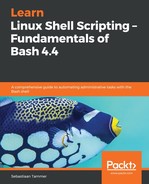At a very basic level, everything that you put on the command line right after calling the script can be used as input. However, it is up to the script to use it! For example, consider the following situation:
reader@ubuntu:~/scripts/chapter_08$ ls
hello-int.sh hello-world-variable.sh name.sh variable-naming-proper.sh variable-naming.sh
reader@ubuntu:~/scripts/chapter_08$ bash name.sh
There once was a guy named Sebastiaan. Sebastiaan enjoyed Linux and Bash so much that he wrote a book about it! Sebastiaan really hopes everyone enjoys his book.
reader@ubuntu:~/scripts/chapter_08$ bash name.sh Sanne
There once was a guy named Sebastiaan. Sebastiaan enjoyed Linux and Bash so much that he wrote a book about it! Sebastiaan really hopes everyone enjoys his book
When we called name.sh the first time, we used the originally intended functionality. The second time we called it, we supplied an extra argument: Sanne. However, because the script does not parse user input at all, the output we saw was exactly the same.
Let's revise the name.sh script so that it actually uses the extra input we specify when calling the script:
reader@ubuntu:~/scripts/chapter_08$ cp name.sh name-improved.sh
reader@ubuntu:~/scripts/chapter_08$ vim name-improved.sh
reader@ubuntu:~/scripts/chapter_08$ cat name-improved.sh
#!/bin/bash
#####################################
# Author: Sebastiaan Tammer
# Version: v1.0.0
# Date: 2018-09-08
# Description: Script to show why we need variables; now with user input!
# Usage: ./name-improved.sh <name>
#####################################
# Assign the name to a variable.
name=${1}
# Print the story.
echo "There once was a guy named ${name}. ${name} enjoyed Linux and Bash so much that he wrote a book about it! ${name} really hopes everyone enjoys his book."
reader@ubuntu:~/scripts/chapter_08$ bash name-improved.sh Sanne
There once was a guy named Sanne. Sanne enjoyed Linux and Bash so much that he wrote a book about it! Sanne really hopes everyone enjoys his book.
Now, that looks much better! The script now accepts user input; specifically, the name of the person. It does this by using the $1 construct: this is the first positional argument. We call these arguments positional because the position matters: the first one will always be written to $1, the second to $2, and so on. There is no way for us to swap these around. Only once we start looking into making our script compatible with flags will we get more flexibility. If we provide even more arguments to the script, we can grab them using $3, $4, and so on.
There is a limit to the number of arguments you can provide. However, it is sufficiently high that you never have to really worry about it. If you get to that point, your script will be unwieldy enough that no one will ever use it anyway!
Notice how, again, we updated the header to include the new input under Usage. Functionally, however, the script isn't that great; we used male pronouns with a female name! Let's fix that real quick and find out what happens if we now omit the user input:
reader@ubuntu:~/scripts/chapter_08$ vim name-improved.sh
reader@ubuntu:~/scripts/chapter_08$ tail name-improved.sh
# Date: 2018-09-08
# Description: Script to show why we need variables; now with user input!
# Usage: ./name-improved.sh
#####################################
# Assign the name to a variable.
name=${1}
# Print the story.
echo "There once was a person named ${name}. ${name} enjoyed Linux and Bash so much that he/she wrote a book about it! ${name} really hopes everyone enjoys his/her book."
reader@ubuntu:~/scripts/chapter_08$ bash name-improved.sh
There once was a person named . enjoyed Linux and Bash so much that he/she wrote a book about it! really hopes everyone enjoys his/her book.
So, we've made the text a little more unisex. However, when we called the script without providing a name as an argument, we messed up the output. In the next chapter we'll dive deeper into error checking and input validation, but for now remember that Bash will not provide an error if variables are missing/empty; you are fully responsible for handling this. We will discuss this further in the next chapter, as this is another very important topic in shell scripting.
